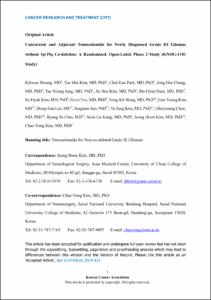KUMEL Repository
1. Journal Papers (연구논문)
1. School of Medicine (의과대학)
Dept. of Radiation Oncology (방사선종양학)
Concurrent and Adjuvant Temozolomide for Newly Diagnosed Grade III Gliomas Without 1p/19q Co-deletion: A Randomized, Open-Label, Phase 2 Study (KNOG-1101 Study)
- Affiliated Author(s)
- 김진희
- Alternative Author(s)
- Kim, Jin Hee
- Journal Title
- Cancer Research and Treatment
- ISSN
- 2005-9256
- Issued Date
- 2019
- Abstract
- Purpose:
We investigated the efficacy of temozolomide during and after radiotherapy in Korean adults with anaplastic gliomas without 1p/19q co-deletion.
Materials and methods:
This was a randomized, open-label, phase 2 study and notably the first multicenter trial for Korean grade III glioma patients. Eligible patients were aged 18 years or older and had newly diagnosed non-co-deleted anaplastic glioma with an Eastern Cooperative Oncology Group performance status of 0-2. Patients were randomized 1:1 to receive radiotherapy alone (60 Gy in 30 fractions of 2 Gy) (control group, n=44) or to receive radiotherapy with concurrent temozolomide (75 mg/m2/day) followed by adjuvant temozolomide (150-200 mg/m2/day for 5 days during 6 28-day cycles) (treatment group, n=40). The primary endpoint was 2-year progression-free survival (PFS). Seventy patients (83.3%) were available for the analysis of the isocitrate dehydrogenase 1 gene (IDH1) mutation status.
Results:
The two-year PFS was 42.2% in the treatment group and 37.2% in the control group. Overall survival (OS) did not reach to significant difference between the groups. In multivariable analysis, age was a significant risk factor for PFS (hazard ratio [HR], 2.08; 95% confidence interval [CI], 1.04 to 4.16). The IDH1 mutation was the only significant prognostic factor for PFS (HR, 0.28; 95% CI, 0.13 to 0.59) and OS (HR, 0.19; 95% CI, 0.07 to 0.50). Adverse events over grade 3 were seen in 16 patients (40.0%) in the treatment group and were reversible.
Conclusion:
Concurrent and adjuvant temozolomide in Korean adults with newly diagnosed non-co-deleted anaplastic gliomas showed improved 2-year PFS. The survival benefit of this regimen needs further analysis with long-term follow-up at least more than 10 years.
- Department
- Dept. of Radiation Oncology (방사선종양학)
- Publisher
- School of Medicine (의과대학)
- Citation
- Kihwan Hwang et al. (2019). Concurrent and Adjuvant Temozolomide for Newly Diagnosed Grade III Gliomas Without 1p/19q Co-deletion: A Randomized, Open-Label, Phase 2 Study (KNOG-1101 Study). Cancer Research and Treatment. doi: 10.4143/crt.2019.421
- Type
- Article
- ISSN
- 2005-9256
- Appears in Collections:
- 1. School of Medicine (의과대학) > Dept. of Radiation Oncology (방사선종양학)
- 파일 목록
-
-
Download
 oak-2019-0302.pdf
기타 데이터 / 643.33 kB / Adobe PDF
oak-2019-0302.pdf
기타 데이터 / 643.33 kB / Adobe PDF
-
Items in Repository are protected by copyright, with all rights reserved, unless otherwise indicated.